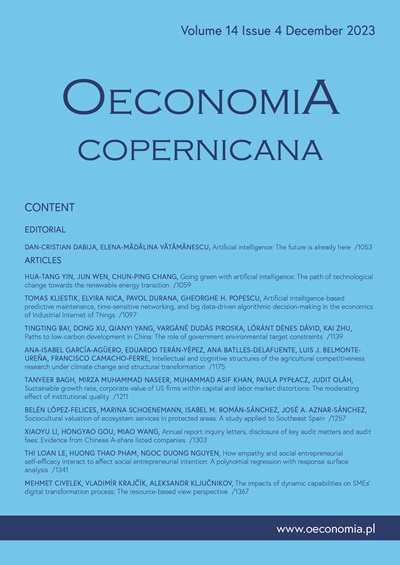Disentangling the impact of ICT adoption on SMEs performance: the mediating roles of corpo-rate social responsibility and innovation
IF 7.6
1区 经济学
Q1 ECONOMICS
引用次数: 18
Abstract
Research background: The literature on the effects of Information and Communication Technologies (ICT) on performance is extensive and shows a significant positive effect. Likewise, the use of ICT to facilitate and report on Corporate Social Responsibility (CSR) practices implemented by Small and Medium Enterprises (SMEs) contributes to improve business performance. Moreover, through innovative activities, firms also obtain competitive advantages that impact positively on their performance, even more so when they are impacted by CSR. For this reason, it is expected that the adoption of ICTs in companies through a CSR-oriented strategy will increase their impact on business performance. Purpose of the article: This article tries to examine how ICT affects SMEs? performance through CSR and innovation. Methods: We tested our hypotheses using a sample of 2,825 Spanish SMEs and by applying a Partial Least Squares Path Modeling (PLS-PM) with a double confirmatory and predictive purpose: to identify the causal relationships between latent variables, and to evaluate the ability of the model to make predictions for individual cases. Findings & value added: The results show that CSR-oriented ICT impacts innovation by changing strategies and business model in companies. Moreover, the implementation of CSR practices gave them competitive advantages to increase their performance. We highlight how innovation gives companies greater capacity to respond to changes in their environment and how innovation positively impacts the link between CSR and performance. Finally, our research makes two significant contributions to the literature by incorporating two sequential mediating effects into the model. On the one hand, the indirect effect of ICT on innovation through CSR. On the other hand, the indirect effect of CSR on SME performance through innovation.信息通信技术应用对中小企业绩效的影响:企业社会责任和创新的中介作用
研究背景:关于信息通信技术(ICT)对绩效影响的文献非常广泛,并显示出显著的正向影响。同样,利用信息和通信技术促进和报告中小企业实施企业社会责任(CSR)的做法,有助于提高企业绩效。此外,通过创新活动,企业还获得了对其绩效产生积极影响的竞争优势,当企业受到企业社会责任的影响时更是如此。因此,预计通过以企业社会责任为导向的战略在公司中采用信息通信技术将增加其对业务绩效的影响。本文目的:本文试图考察信息通信技术如何影响中小企业?通过企业社会责任和创新实现绩效。方法:我们以2825家西班牙中小企业为样本,运用偏最小二乘路径模型(PLS-PM)检验了我们的假设,该模型具有双重验证性和预测性目的:确定潜在变量之间的因果关系,并评估模型对个别情况进行预测的能力。研究结果与附加值:研究结果表明,以企业社会责任为导向的信息通信技术通过改变企业的战略和商业模式来影响创新。此外,企业社会责任实践的实施给他们带来了竞争优势,以提高他们的绩效。我们强调创新如何使公司更有能力应对环境变化,以及创新如何积极影响企业社会责任与绩效之间的联系。最后,我们的研究通过将两个顺序的中介效应纳入模型,对文献做出了两个重大贡献。一方面,信息通信技术对企业社会责任创新的间接影响。另一方面,企业社会责任通过创新对中小企业绩效的间接影响。
本文章由计算机程序翻译,如有差异,请以英文原文为准。
求助全文
约1分钟内获得全文
求助全文
来源期刊

Oeconomia Copernicana
ECONOMICS-
CiteScore
13.70
自引率
5.90%
发文量
26
审稿时长
24 weeks
期刊介绍:
The Oeconomia Copernicana is an academic quarterly journal aimed at academicians, economic policymakers, and students studying finance, accounting, management, and economics. It publishes academic articles on contemporary issues in economics, finance, banking, accounting, and management from various research perspectives. The journal's mission is to publish advanced theoretical and empirical research that contributes to the development of these disciplines and has practical relevance. The journal encourages the use of various research methods, including falsification of conventional understanding, theory building through inductive or qualitative research, first empirical testing of theories, meta-analysis with theoretical implications, constructive replication, and a combination of qualitative, quantitative, field, laboratory, and meta-analytic approaches. While the journal prioritizes comprehensive manuscripts that include methodological-based theoretical and empirical research with implications for policymaking, it also welcomes submissions focused solely on theory or methodology.
 求助内容:
求助内容: 应助结果提醒方式:
应助结果提醒方式:


